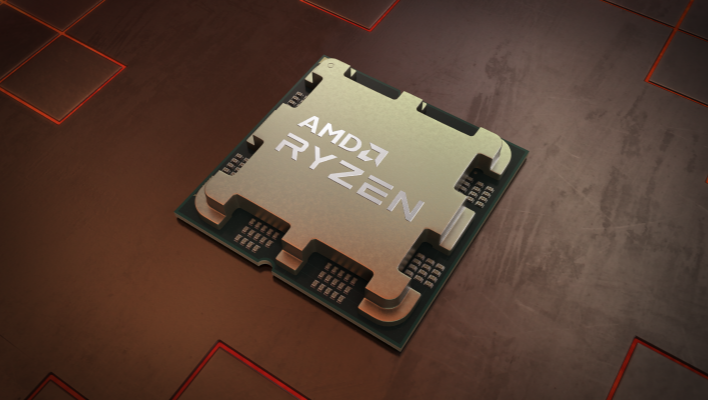AMD Explains Why Future Ryzen Chips Might Run Hotter in Wide-Ranging Interview

The launch of the Ryzen 3000 series in 2019 led not just to a dramatic rise in the performance of AMD CPUs, but also temperatures. Since then, it hasn't gotten any better—the latest Ryzen 7000 series has even pushed the normal operating temperature to 95C, so that the flagship Ryzen 9 7900X and 7950X could run at full bore. The heat won't be coming down any time soon though, as AMD Vice President David Mcafee made clear in an interview with QuasarZone.
There are two main reasons why Ryzen CPUs get so hot, especially nowadays. Firstly, there's an industry wide trend at cutting-edge silicon fabs like TSMC where density gains are outstripping efficiency gains. Inevitably, this results in higher heat and power density for high-end chips that CPU designers like AMD want to run at high clock speeds. Letting performance go down to let power and heat go down simply isn't an option.
The other reason is that AMD's high performance chiplet CPUs isolate the hot CPU cores from the rest of the chip, denying the opportunity to allow that heat to spread across a processor before going out through the heatspreader and into the cooler. In a monolithic CPU made of a single piece of silicon, the heat generated by CPU cores can spread to other parts of the chip, which increases the surface area dedicated to transferring heat to the heatspreader. Chips are already getting hotter due to how nodes are turning out, and chiplets exacerbate the heat density.

Higher heat density is an inherent drawback of chiplet technology, so the only realistic way to bring it under control is by utilizing better process nodes. Speaking to QuasarZone, Mcafee stated AMD is working closely with TSMC (which has fabbed all AMD chips since 2017) on process technology, but that high heat density is ultimately here to stay. Although Mcafee goes on to say that it's a priority for AMD to solve the high heat density effect for its CPU chiplets, it's not clear what the solution would be. However, if the heat won't go down, then raising the safe temperature limit from 95C is a possible alternative.
The AMD executive also pointed out that its lower power non-X Ryzen chips didn't exhibit this heat problem and still had great performance. Although lowering clock speeds and voltage worked very well for lower power Ryzen chips like the Ryzen 5 7600, Ryzen 7 7700, and Ryzen 9 7900, it obviously won't be an option for flagship processors. This is made clear particularly with the 7900, which is significantly slower than the 7900X while the 7600 and 7700 are pretty much equal to their X-class counterparts.
There are two main reasons why Ryzen CPUs get so hot, especially nowadays. Firstly, there's an industry wide trend at cutting-edge silicon fabs like TSMC where density gains are outstripping efficiency gains. Inevitably, this results in higher heat and power density for high-end chips that CPU designers like AMD want to run at high clock speeds. Letting performance go down to let power and heat go down simply isn't an option.
The other reason is that AMD's high performance chiplet CPUs isolate the hot CPU cores from the rest of the chip, denying the opportunity to allow that heat to spread across a processor before going out through the heatspreader and into the cooler. In a monolithic CPU made of a single piece of silicon, the heat generated by CPU cores can spread to other parts of the chip, which increases the surface area dedicated to transferring heat to the heatspreader. Chips are already getting hotter due to how nodes are turning out, and chiplets exacerbate the heat density.

Higher heat density is an inherent drawback of chiplet technology, so the only realistic way to bring it under control is by utilizing better process nodes. Speaking to QuasarZone, Mcafee stated AMD is working closely with TSMC (which has fabbed all AMD chips since 2017) on process technology, but that high heat density is ultimately here to stay. Although Mcafee goes on to say that it's a priority for AMD to solve the high heat density effect for its CPU chiplets, it's not clear what the solution would be. However, if the heat won't go down, then raising the safe temperature limit from 95C is a possible alternative.
The AMD executive also pointed out that its lower power non-X Ryzen chips didn't exhibit this heat problem and still had great performance. Although lowering clock speeds and voltage worked very well for lower power Ryzen chips like the Ryzen 5 7600, Ryzen 7 7700, and Ryzen 9 7900, it obviously won't be an option for flagship processors. This is made clear particularly with the 7900, which is significantly slower than the 7900X while the 7600 and 7700 are pretty much equal to their X-class counterparts.

